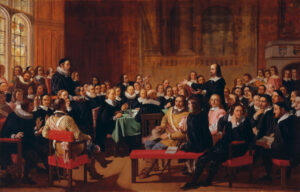In previous posts we looked at how our pursuit of our joy by living lives of holiness is founded on union with Christ.1 However, since having real and authentic fellowship or communion with Christ should be the earnest desire of all genuine believers and since a life of holiness is fueled by this communion with Christ, it is crucial that ask—“what does it mean to have authentic communion with Christ?” and “how does this happen?” In what follows, I will lay out six tangible aspects of what it means to have communion with Christ, drawing on a range of the most important Puritan and Reformed authors, who have most clearly and wonderfully articulated these biblical truths.
Communion Flows Consequentially from Union
First, communion with Christ is consequential in that it flows from union with Christ. William Bridge notes that since union with Christ is the root of communion with Christ therefore, given Christ’s nearness to the believer, the communion is all the more intimate. He says, “now if Christ should be only in a believer by the habit of grace, the union would not be so great: but if this be true, that Christ is really in a believer by his Spirit, Christ really united to each believer, here the union is dearer, and therefore the communion and fellowship that a believer shall have with Christ, a great deal more and more blessed.”2
Communion Flows Immediately from Union
Second, since our union with Christ is genuine, our communion with Christ is immediate. Thomas Boston, in his Human Nature in Its Fourfold State explain how the believer’s “communion with Christ” is “the immediate consequence of union with Him.” He fleshes this out using Jesus’s illustration of the vine and the branches, saying “for as the branch, immediately upon its union with the stock, has communion with the stock in all that is in it, so the believer uniting with Christ, has communion with Him.”3 Indeed, since communion is to be the immediate, unavoidable consequence of being united to Christ and a normative experience for a Christian, believers are called to know by experience the vital communion flowing to the branches from the truck of union with Christ (and vice versa).
Communion with Christ is by the Spirit of Christ
Third, communion with Christ is only enabled by the indwelling of the Holy Spirit. As John Owen explains, “our union with him, with all the benefits[s] thereon depending, floweth from this his communication of the Spirit unto us, to abide with us, and to dwell within us” 4 Indeed, the Lord calls us through this teach to taste and see that we not only are in Christ, but the same Spirit that raised Christ from the dead also dwells in us.
Communion with Christ is Deeply Personal
Fourth, our communion with Christ is deeply personal. For God set us apart not to a task, but to a person, namely Himself. It is no wonder that William Bridge argues that the believer’s communion with Christ is more deeply personal than the greatest of marriages. He makes his point by way of comparison, explaining that “the nearer the union, the greater the communion.” Thus, if a “husband and the wife are first joined together, and united, and then they have communion with one another and fellowship in their goods and estate” how much more will we who are engrafted into Christ and have the very Spirit of Christ living in us?5 As Sinclair Ferguson points out, God united us to Himself that we might have a “deeply personal, intense, loving devotion to him—a belonging to him that is irreversible, unconditional, without any reserve on our part. Simply put, it means being entirely his, so that all we do and possess are his.” 6 This presses upon us the need to experience the glory of union and communion with Christ—to be entirely possessed by Jesus and to have a full and real communion with Him.
Communion with Christ is Experientially Joy-filled
Fifthly, communion with Christ should be experientially joyful. Thomas Boston explains that when the believer is united to Christ “he launches forth into an ocean of happiness, is led into a paradise of pleasures, and has a saving interest in the treasure hid in the field of the Gospel, the unsearchable riches of Christ.”7 Likewise, William Bridge says that “if Jesus Christ be really united to each believer by his Spirit, and really in him in this spiritual and mystical way; then a believer shall have more blessed and glorious communion with Christ than the other way.” 8 This reality challenges us to examine ourselves whether our private and corporate worship is merely an gloomy obligation or a joy-filled opportunity.
Communion with Christ Must Be Continually Maintained
Finally, communion with God must be maintained continually. Thomas Boston says that the believer, by faith, must derive “fresh supplies of grace from the fountain thereof in Him.”9 God’s very design is that we would continually receive grace through the individual and corporate means of grace that God has provided through his word, prayer, and sacraments. Finally, communion with Christ is transformative and never leaves us that same.10 Oh Lord, please change us from the inside out, we long to be transformed into your “very image, from one degree of glory to another” (2 Cor. 3:18) experiencing “the unsearchable riches of Christ” (Eph. 3:8).
[1] This article is an expand and updated version of one section of Greg Salazar, “Growing in Christ-likeness,” in Joel R. Beeke, ed., Growing in Grace (Grand Rapids: Reformation Heritage Books, 2020).
[2] William Bridge, The Works of the Rev. William Bridge (5 vols.; London: Thomas Tegg, 1845; repr., Beaver Falls, Pa.: Soli Deo Gloria Publications, 1989), 1:371.
[3] Thomas Boston, Human Nature in Its Fourfold State (Edinburgh: Banner of Truth Trust, 1964), p.285
[4] John Owen, The Works of John Owen, 16 vols., (Edinburgh: Banner of Truth Trust, 1965), 2:199
[5] Bridge, Works, 1:371.
[6] Sinclair B. Ferguson, Devoted to God: Blueprints for Sanctification (Edinburgh: Banner of Truth Trust, 2016), p.4.
[7] Boston, Human Nature in Its Fourfold State, p.285
[8] Bridge, Works, 1:371.
[9] Boston, Human Nature in Its Fourfold State, p.316
[10] Ferguson, Devoted to God, p.55.



